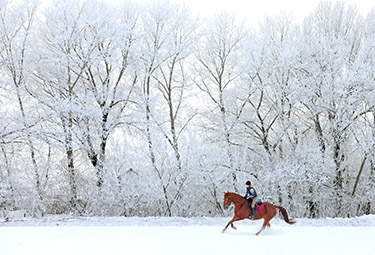Tips for Winter Skin: Keeping Horses Healthy

Grooming
Most horses enjoy a good brushing; not only does it help to rid their coat of dirt, bacteria, and foreign material, but it feels good! Frequent brushing also helps to stimulate the sebaceous glands’ secretion of sebum, a waxy substance that gives the coat its shine and increases the comfort level of the animal during the winter by:
- Coating the hair
- Waterproofing the coat
Advising clients to maintain a grooming regimen even if they aren’t riding the animal is important. Not only will it keep the skin healthy, but it provides a means to look for any skin conditions, lumps, cuts and scratches that may need to be checked out.
Bathing
While a good bath also helps to remove loose hair and dirt, clients should be advised to avoid bathing their horse in cold weather unless they have a draft-free, heated area available If the animal becomes chilled, not only will it lower its resistance to infection, but it will also predispose it to respiratory diseases. Remind clients that a wet coat loses its insulating ability.
If it is absolutely necessary to give the animal a bath in cold, winter weather, clients should be advised to follow these steps:
- Choose a good horse wash that preserves the natural skin oils
- To keep the animal comfortable, instead of doing a full body wash, hand-bathe with a dampened sponge one body section at a time; sponge-rinse with warm water
- Use a sweat scraper to remove any excess water
- Vigorously rub the washed section of the horse with a towel until the coat feels dry
- A hair dryer can be used to speed up the drying process as long as it is constantly moved over the animal’s skin
- If there is no hair dryer, cover the horse with a blanket
- Walk the horse until it is dry
Skin Conditions
There are several skin conditions that can affect a horse in the winter, and clients should know that part of the reason for establishing a grooming regimen is to check for any types of developing skin issues that require care. Five very common skin disorders that affect horses in the winter time include:
- Ringworm
- Fungal infection
- Lives on the skin surface
- Causes patchy hair loss
- Appears as a circle with hair loss in the center and the rim is a red ring
- Skin inside the circle becomes scabby and sometimes raw
- Transmitted by contact with contaminated horses and tack
- Is transmittable to and from humans
- Rain scalds or rot
- Caused by bacteria, Dermatophilus Congolensis
- Occurs in rainy weather
- Causes tufts of hair loss that leaves bare patches
- Often affects the back and rump
- May resemble ringworm
- Skin may become infected
- Grease Heel or Scratches
- Caused when breaks in the skin become infected with bacteria
- Often occurs when horses have to stand in wet, muddy areas
- Affects legs–common in horse breeds with long fetlock hair
- Establishes a skin infection at the back of the heel and the pastern
- Painful pyoderma with greasy exudation that mats the hairs
- Animal may become lame
- Dandruff
- If the animal has dry, scaly skin, the dandruff is the result of cold, dry air and reduced skin circulation
- If the animal has excessively dry, scaly skin, the cause is probably nutritional
- Lice
- Mainly a winter problem
- Thrive in cold weather when the hair is longer
- Transferred from horse to horse and by contact with tack and equipment
- Not transferable to humans
- Sucking lice can cause anemia
- Biting lice can cause skin irritation and itching; areas become raw and hairless
Remind clients that the care they give their horse during the winter will be repaid come spring. For more winter weather tips, contact your Covetrus representative at 855.724.3461.
Sources:
http://horseandrider.com/article/wintergrooming_122004-12995
http://www.thehorse.com/articles/11724/winter-skin-problems


Working Here
Our team members are encouraged to be the best they can be... at Covetrus we believe we impact one another.
Learn MoreNews & Events
FDA Cautions Pet Owners Not to Feed Texas Tripe Inc. Raw Pet Food Due to Salmonella, Listeria Monocytogenes
The U.S. Food and Drug Administration is cautioning pet owners not to feed their pets any of the Texas Tripe brand raw frozen pet food listed below because several samples of Texas Tripe raw pet food have tested positive for Salmonella and/or L. mono.
Careers
Are you looking for a place to let your talents shine? At Covetrus, we help our practitioner customers better serve their patients and take pride in providing the best customer experience possible. Search our open positions to see our available opportunities.
Newsletter
Stay current with what’s going on with Covetrus, subscribe to receive our newsletter and email communications. Subscribers will receive the latest information in practice management, sales and marketing, animal health, and more.



-3-(1).png?sfvrsn=2d806d73_0)
